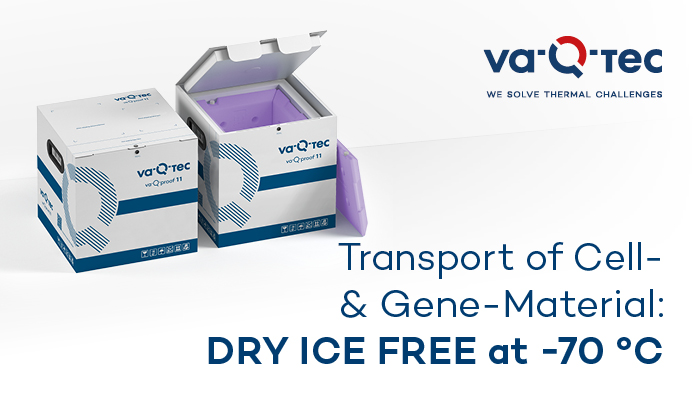
- va-Q-tec has developed a new phase-change material (PCM) that enables transport at -70 °C without the use of dry ice.
- Using the new PCM cultures for cell and gene therapy and other items can be transported safely for up to 72 hours.
- The solution reduces transport risks and eases restrictions caused by dry ice.
- In this way the company is expanding its comprehensive thermal portfolio with a dry-ice-free alternative, e.g., for cell and gene transport.
Würzburg, November 28, 2023. Cell and gene therapy is a field of medicine that is setting new standards in relation to the fight against illnesses such as cancer, Alzheimer’s, dementia and heart failure. These technologies are opening the possibility of healing even the most serious illnesses. For them to succeed, biopharmaceutical companies need to transport blood and cell cultures at constant low temperatures. va-Q-tec, the expert for thermal energy efficiency and temperature-controlled supply chains, is launching a new phase-change material (PCM): This innovative material enables transportation at -70 °C without the use of dry ice. The innovation is supplementing the company’s portfolio of reusable solutions with an important alternative.
-67G PCM is a high-performance latent heat storage material that makes the use of dry ice unnecessary for certain transport tasks. Dry ice is carbon dioxide (CO2) in a solid state that evaporates during transport and during storage. Accordingly, CO2 is released during its manufacture, storage, and transport. Dry ice is also a hazardous material and, along with the safety precautions necessary during handling, is also subject to air freight restrictions.
The new phase-change material –67G enables safe transportation: It is not a hazardous material in accordance with IATA rules, it is also neither toxic nor flammable and can be reused hundreds of times without any loss of performance. These characteristics make it extremely sustainable compared to dry ice. They also make it easier to plan logistics: dry ice is often not available in sufficient quantity at short notice. Conversely, shippers can have the cooled PCM available anytime. Therefore, biopharmaceutical companies can minimize the use of dry ice to situations where its use is unavoidable, such as for long-distance intercontinental transport. In some scenarios within the clinical-pharmaceutical sector, maintaining a temperature of -70 C for extended periods during transport is necessary. When used in va-Q-proof packaging, the new -67G PCM is qualified for up to 72 hours below -60 °C.
“Solutions with dry ice have disadvantages. With this innovative technology that does not require dry ice, we offer our customers and partners the possibility to choose the option that is most suitable for their specific application. In this way we can further limit the harmful effects and to some extent the hazardous handling of dry ice”, says Dr Joachim Kuhn, CEO and founder of va-Q-tec.
You will find further information in the recorded webinar “Which thermal packaging solutions for -70 °C shipments fulfill the requirements of various applications such as cell and gene therapies?” at: https://www.va-q-tec.com/en/infocenter/events/webinars-on-demand/
